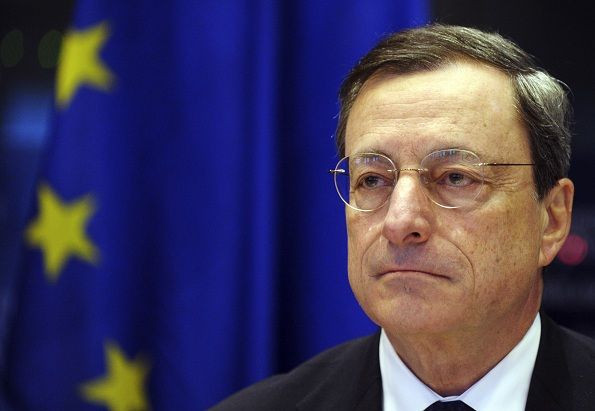ECB Head Draghi Sees Euro-Zone Recovery But Hedges His Bets As Bank Holds Interest Rates Steady

The head of the European Central Bank, which Thursday held its key interest rates steady, gave mixed signals about prospects that the euro zone could pull itself out of a recession.
The ECB's 23-member board decided unanimously to keep its main refinancing rate at 0.75 percent, its deposit facility rate at 0 percent and its marginal lending facility rate at 1.5 percent. That suggested that the bank believes members' economies don't need the help that the ECB can give by printing more money.
It also sent the value of the euro up 1.24 percent against the dollar in noon EST trading.
"The euro really jumped when (Draghi) said the decision was unanimous," John Hardy, head of foreign-exchange strategy at Saxo Bank A/S in London told Bloomberg News. "It's throwing some uncertainly onto whether there will be a cut in one of the coming meetings. The odds of that have been reduced."
After the ECB interest rate announcement ECB Pres. Mario Draghi held a news conference in which he gave mixed signals about the bank's outlook for the euro zone, which is in a recession that is worsening.
Draghi said "a gradual recovery" should start later this year but also warned that his outlook might end up being optimistic.
“The risks surrounding the economic outlook for the euro area remain on the downside,” he said. “They are mainly related to slow implementation of structural reforms in the euro area, geopolitical issues and imbalances in major industrialized countries. These factors have the potential to dampen sentiment for longer than currently assumed and delay further the recovery of private investment, employment and consumption.”
A moment later, however, he poured some cold water on his own outlook.
“Later in 2013 economic activity should gradually recover. In particular, our accommodative monetary policy stance, together with significantly improved financial market confidence and reduced fragmentation, should work its way through to the economy, and global demand should strengthen.”
That upbeat comment as well as the fact that the ECB chose not to give monetary relief to its constituents, belies increasingly grim statistics from the 17-member euro zone, where unemployment rose in November to 11.8 percent. Further, Greek unemployment hit a record 26.8 percent in October as the debt-choked nation begins its sixth year in recession.
Last month the ECB slashed its 2013 economic outlook for the euro zone to a contraction of 0.3 percent from a growth of 0.5 percent.
Draghi said that whether things improve in the euro zone will depend on several factors, including:
-- strengthening bank balance sheets and establishing “an integrated financial framework” that will oversee banks in the monetary union,
-- increasing the competitiveness of member nations’ economies by making their labor markets more flexible;
-- inflation remaining under control; and
-- oil prices stabilizing.
Analysts expect the bank to walk back Thursday's optimism.
“Overall, then, the strong message was that the ECB is content for now to use the breathing space afforded to it by the continued low level of government bond yields to leave the onus firmly on euro-zone governments to tackle their own problems through fiscal and structural reform,” Jonathan Loynes, chief European economist for Capital Economics, said.
“Another cut in interest rates and/or the adoption of more non-standard monetary policy measures like quantitative easing therefore appear to be firmly off the near-term agenda. However, if we are right in expecting the news on the economy to remain very weak, prompting market concerns over the outlook for the highly indebted peripheral economies to re-escalate, then it is surely only a matter of time before the ECB will be forced to put its money where its mouth is and fire the (Outright Monetary Transactions program) bazooka. The risk of disappointment remains high.”
© Copyright IBTimes 2024. All rights reserved.






















